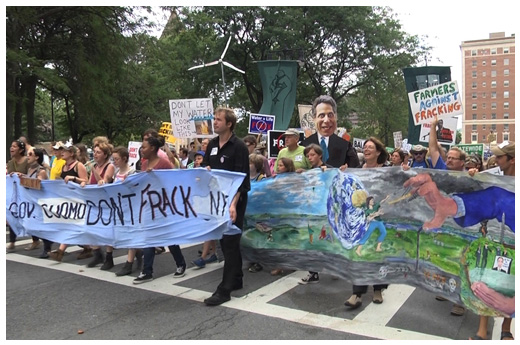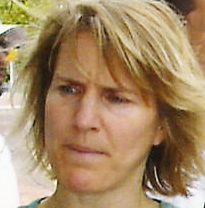 by guest blogger Maya K. van Rossum, the Delaware Riverkeeper
by guest blogger Maya K. van Rossum, the Delaware Riverkeeper
“Never doubt that a small group of thoughtful committed individuals can change the world. In fact, it’s the only thing that ever has.” —Margaret Mead
Clean water, clean air, and healthy food grown in healthy soils are fundamental human rights. And yet, those rights are being taken from us in service to the greed and power of the energy industry. Politicians benefitting from high-value campaign contributions are laying this country bare to old-money energy sources dependent on fracking, drilling, mountaintop removal, and ever-increasing toxic contamination that are polluting our bodies, our drinking water, air, and food supply. These extreme energy practices are transforming our once-safe residential communities and public lands into unhealthy and polluted industrial landscapes that make our daily lives fraught with increasing peril. (Have you seen the pictures of the oil spill that recently consumed a residential community in Arkansas?) We have a moral obligation to do what we can to keep our natural environment healthy for generations to enjoy. Are we doing all we can?
Across the nation, communities concerned about the health of our environment and the ramifications of global climate change are feeling disenfranchised, undermined, and betrayed by elected officials at every level of government. The increasing loyalty to the energy industry demonstrated by politicians is causing a rise in public dissent. After repeated and fruitless efforts to wade through the approved bureaucratic channels and have their voices heard regarding our energy future, people of all walks of life are turning to their last option: protest.
Protests, sit-ins, blockades, and street theater are among the methods being used to demand a sustainable energy path that rejects fracking, drilling, and other extreme forms of energy extraction.
In 2013 we have already seen a variety of actions:
- In January, 1,000-plus people joined together in Albany, New York, to protest a plan that would open New York state to high-volume hydraulic fracking and drilling.
- In February, 40,000 people convened on Washington, DC, to demand responsible action on the Keystone XL Pipeline and climate change.
- In March, more than 100 people took control of a meeting of an interstate commission, the Delaware River Basin Commission, and for two hours held an orderly public hearing demanding action on gas pipelines, preventing the commission from conducting any business other than addressing the issue of pipelines.
We need a sensible and sustainable energy future, one that puts Americans at the forefront of developing and constructing sustainable energy technologies like solar, wind, and geothermal. And we need to support the next generation of energy technologies created from homegrown thinkers right here in the U.S.
The Civil Rights Movement began with a few simple but brave and important acts: a refusal to change seats on a bus, a sit-in at a lunch counter, a protest in support of equal access to good schools, protests by college students who stood in solidarity with the demand for equal rights across racial divides. Despite the many attempts to ignore, dismiss, or overshadow these important and brave acts, the Civil Rights Movement grew and the power of the message and its substantive validity finally broke through.
That is the path of today’s environmental movement.
Politicians, including the president, who respond to public outcry with glossy political rhetoric about clean coal, safe fracking, and doing drilling right don’t demonstrate a commitment to a sound energy future. They reveal an ignorance of the facts and a disturbing level of deafness to the voices of their constituents, which are getting louder daily. If our elected officials want the bright light of history to smile upon them, they should take immediate and meaningful steps to protect our environment and pursue truly green energy solutions.
Here’s how you can get active:
- Learn how to create local Actions Against Fracking in your community
- Attend the EcoSocialist Conference: System Change, Not Climate Change on Saturday, April 20
- Join the Stop the Frack Attack week of action in June
- Check the Marcellus Shale Protest event calendar.
Actions on energy are routinely posted at the websites of:
And you can also take action online to stand strong for clean water and healthy communities, including the legal exercise of your First Amendment rights, by:
- Signing the Petition to Ban Fracking
- Pledging to Protect the Delaware River (a cause close to my own heart)
 Maya K. van Rossum is the Delaware Riverkeeper, and has led the Delaware Riverkeeper Network (DRN) since 1994. The DRN is a regional nonprofit advocacy organization that monitors the river and all of its tributaries for threats and challenges, and advocates, educates, and litigates for protection, restoration, and change.
Maya K. van Rossum is the Delaware Riverkeeper, and has led the Delaware Riverkeeper Network (DRN) since 1994. The DRN is a regional nonprofit advocacy organization that monitors the river and all of its tributaries for threats and challenges, and advocates, educates, and litigates for protection, restoration, and change.




Excellent. Our community faces the threat of uranium mining. The owner of a site just a few miles from our farm is seeking permission to turn it into a uranium mine and mill and we’ve been part of the effort to prevent that. This year we were successful, but this fall the fight resumes. So I definitely get your point.
Here is something from Wendell Berry, which I think suggests the bigger picture of protest, and is worth keeping in mind.
We are living in the most destructive and, hence, the most stupid period of the history of our species. The list of its undeniable abominations is long and hardly bearable. And these abominations are not balanced or compensated or atoned for by the list, endlessly reiterated, of our scientific achievements. Some people are moved, now and again, to deplore one abomination or another. Others deplore the whole list and its causes. Much protest is naive; it expects quick, visible improvement and despairs and gives up when such improvement does not come. Protesters who hold out longer have perhaps understood that success is not the proper goal. If protest depended on success, there would be little protest of any durability or significance. History simply affords too little evidence that anyone’s individual protest is of any use. Protest that endures, I think, is moved by a hope far more modest than that of public success: namely, the hope of preserving qualities in one’s own heart and spirit that would be destroyed by acquiescence.
– Wendell Berry, from his essay “A Poem of Difficult Hope” (1980)
Thank you for the great article and for the words of Wendall Berry. In my younger years I saw incredible beauty in some of our national parks and re-visiting them in my senior years has been heartbreaking. Yosemite and Yellowstone especially have taken a beating by pollution. Our great rivers flow with mercury, pcbs, and all forms of toxic swill. Just under our oceans surface is a merky mix of plastic and debris that won’t just go away. There is no longer pride in taking care of what we have. We have allowed the corporations to take over and destroy our our planet and the very food that sustains us. We have become complacent, lazy consumers mostly living beyond our means. If you think that we are not paying the price for this, think again. We pay the price with poor health from all types of pollution and our children are in great jeopardy. I may not see it in my lifetime, but I hope the ‘resistance’ gets louder and stronger. Thank you for the wake up calls you send.